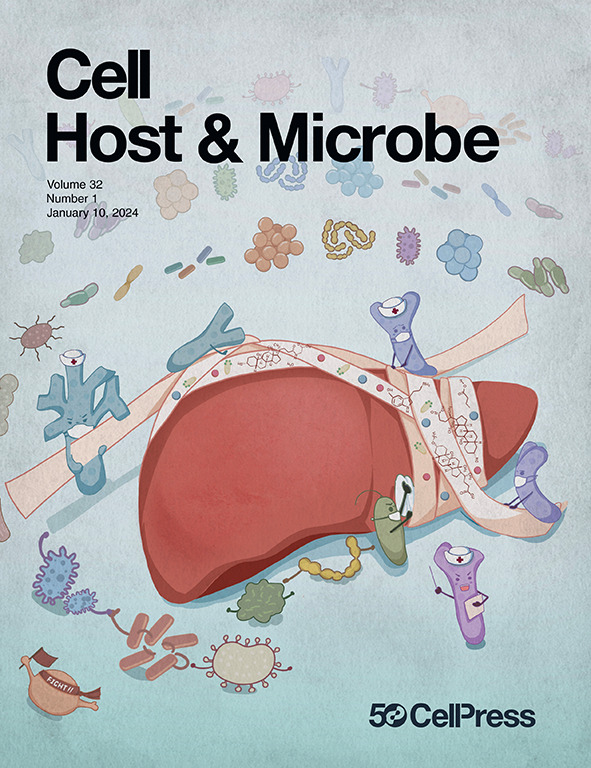人类遗传学和肿瘤内微生物群在结直肠癌进展中的相互作用
IF 20.6
1区 医学
Q1 MICROBIOLOGY
引用次数: 0
摘要
肿瘤内微生物群在癌症进展中起着至关重要的作用。然而,宿主遗传学与肿瘤内微生物群之间的关系以及它们在结直肠癌(CRC)进展中的相互作用仍不清楚。我们从三个队列中纳入了748名中国结直肠癌患者,发现位于atp敏感的内向整流钾通道11 (KCNJ11)内含子上的单核苷酸多态性(SNP) rs2355016与梭杆菌的丰度显著相关。与rs2355016 GG基因型相比,携带A等位基因的患者表现出KCNJ11的下调和梭杆菌的富集,这对应于增殖和进展的加速。KCNJ11的低表达可以增加CRC细胞表面半乳糖- n -乙酰-d-半乳糖胺(Gal-GalNAc)的水平,从而促进F. nucleatum的Fap2蛋白与Gal-GalNAc的结合。这进一步增强了具核梭菌的粘附和侵袭,促进结直肠癌的生长。我们的研究探讨了结直肠癌患者肿瘤内微生物群与snp之间的相互作用,这将增强我们对结直肠癌增殖的理解。本文章由计算机程序翻译,如有差异,请以英文原文为准。

An interplay between human genetics and intratumoral microbiota in the progression of colorectal cancer
Intratumoral microbiota plays a crucial role in cancer progression. However, the relationship between host genetics and intratumoral microbiota, as well as their interaction in colorectal cancer (CRC) progression, remains unclear. With 748 Chinese CRC patients enrolled from three cohorts, we find that the single nucleotide polymorphism (SNP) rs2355016, located in the intron of ATP-sensitive inward rectifier potassium channel 11 (KCNJ11), is significantly associated with the abundance of Fusobacterium. Compared with the rs2355016 GG genotype, patients carrying the A allele exhibit downregulation of KCNJ11 and enrichment of Fusobacterium, which corresponds to accelerated proliferation and progression. Low expression of KCNJ11 can increase the level of galactose-N-acetyl-d-galactosamine (Gal-GalNAc) on the surface of CRC cells, thereby facilitating the binding of the Fap2 protein from F. nucleatum to Gal-GalNAc. This further enhances the adhesion and invasion of F. nucleatum and promotes CRC growth. Our study explores the interaction between intratumoral microbiota and SNPs in CRC patients, which will enhance our understanding of CRC proliferation.
求助全文
通过发布文献求助,成功后即可免费获取论文全文。
去求助
来源期刊

Cell host & microbe
生物-微生物学
CiteScore
45.10
自引率
1.70%
发文量
201
审稿时长
4-8 weeks
期刊介绍:
Cell Host & Microbe is a scientific journal that was launched in March 2007. The journal aims to provide a platform for scientists to exchange ideas and concepts related to the study of microbes and their interaction with host organisms at a molecular, cellular, and immune level. It publishes novel findings on a wide range of microorganisms including bacteria, fungi, parasites, and viruses. The journal focuses on the interface between the microbe and its host, whether the host is a vertebrate, invertebrate, or plant, and whether the microbe is pathogenic, non-pathogenic, or commensal. The integrated study of microbes and their interactions with each other, their host, and the cellular environment they inhabit is a unifying theme of the journal. The published work in Cell Host & Microbe is expected to be of exceptional significance within its field and also of interest to researchers in other areas. In addition to primary research articles, the journal features expert analysis, commentary, and reviews on current topics of interest in the field.
 求助内容:
求助内容: 应助结果提醒方式:
应助结果提醒方式:


